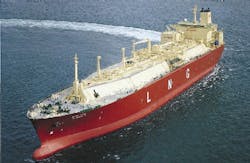Shell and Kinder Morgan announce plans to export LNG from the US
Amidst growing controversy around the subject of unleashed U.S. natural gas exports, Shell US Gas & Power a subsidiary of Royal Dutch Shell, and Southern Liquefaction Co., a Kinder Morgan company and unit of El Paso Pipeline Partners, L.P. (EPB), are forming a limited liability company to develop a natural gas liquefaction plant in two phases at Southern LNG Co.’s existing Elba Island LNG Terminal, near Savannah, Ga.
At the same time, news reports yesterday indicated that the American Chemistry Council, a leading trade group for the chemical industry, was redacting its previous statement in support of unlimited U.S. natural gas exports.
RELATED: LNG key to supplying Asia Pacific energy needs
Subject to various corporate and regulatory approvals, Shell and Kinder Morgan affiliates have agreed to modify EPB’s Elba Express Pipeline and Elba Island LNG Terminal to physically transport natural gas to the terminal and to load the liquefied natural gas (LNG) onto ships for export.
“Kinder Morgan is delighted to be working with Shell at Elba Island on this project, which has already received Free Trade Agreement approval,” said Kinder Morgan Chairman and CEO Richard D. Kinder. Kinder added that the facility anticipates receiving non-Free Trade Agreement approval in due course.
RELATED: Spectra Energy to provide natural gas for Eastman Chemicals Kingsport facility
Once finalized, EPB, through its affiliates, will own 51% of the entity and operate the facility. Shell, through its affiliates, will own the remaining 49% and subscribe to 100% of the liquefaction capacity. The project will use Shell’s innovative small-scale liquefaction unit, which will be integrated with the existing Elba Island facility and enable rapid construction compared to traditional large-scale plants.
The total project is expected to have liquefaction capacity of approximately 2.5 million tonnes per year (mtpa) of LNG or 350 million cubic feet of gas per day (Mmcfd). In June 2012, the Elba Island terminal received approval from the U.S. Department of Energy (DOE) to export up to 4 mtpa (500 Mmcfd) of LNG to Free Trade Agreement (FTA) countries. In August 2012, the terminal submitted a filing to the DOE seeking approval to export up to 4 mtpa (500 Mmcfd) of LNG to non-FTA countries. Phase I of the project, approximately 1.5 mtpa (210 Mmcfd), requires no additional DOE approval.
